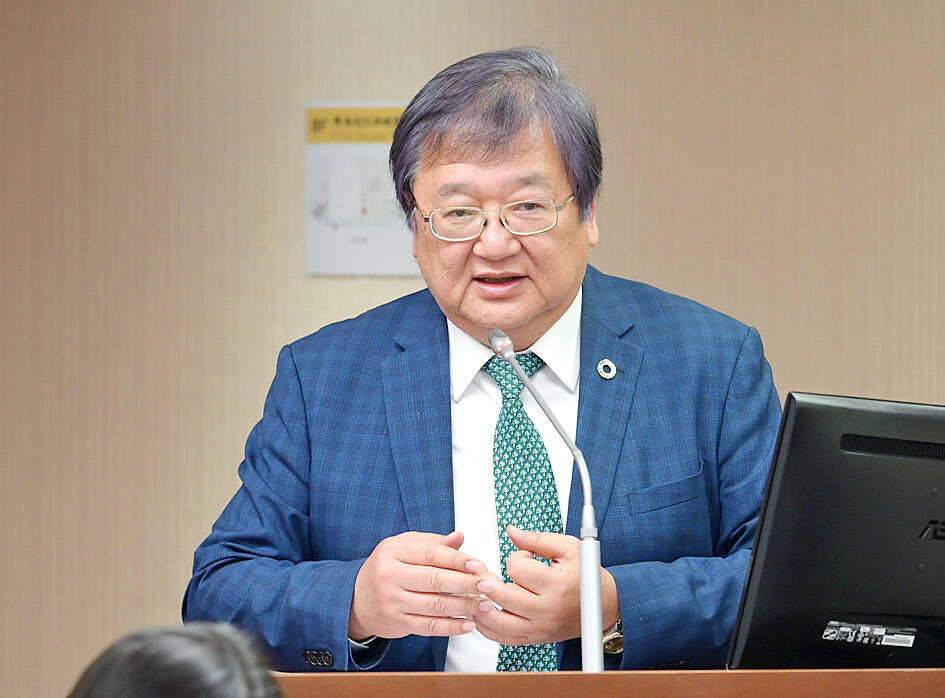The Advisory Committee on Immunization Practices (ACIP) in a meeting next month would discuss who would be eligible to receive government-funded COVID-19 vaccines in fall and winter, Minister of Health and Welfare Chiu Tai-yuan (邱泰源) said yesterday.
Chiu was attending a meeting of the legislature’s Social Welfare and Environmental Hygiene Committee.
After US Secretary of Health and Human Services Robert F. Kennedy Jr on Tuesday announced that the US would no longer place children and pregnant women on the list of people recommended to be vaccinated against COVID-19, reporters asked Chiu whether the ministry is planning to follow suit.

Photo: Wang Yi-song, Taipei Times
“The ministry would decide on which groups would be recommended to receive COVID-19 vaccines following expert discussions at the ACIP,” Chiu said.
The number of COVID-19 cases in Taiwan has increased for seven consecutive weeks, ministry data showed.
The Centers for Disease Control (CDC) estimated that the peak of the epidemic would not arrive until the end of next month or the beginning of July, with the number of people seeking medical attention potentially reaching 150,000 to 200,000.
The US is expected to scale down the recommended groups to receive COVID-19 vaccines in a meeting next month, CDC Deputy Director-General Philip Lo (羅一鈞) said.
The ACIP is also scheduled to convene around the middle of next month to discuss which groups of people would be eligible to receive government-funded COVID-19 vaccines in fall and winter, Lo said.
The US CDC has yet to update information on its Web site regarding groups recommended to receive COVID-19 shots, Lo said.
“Experts would discuss whether it is feasible to encourage people to get both COVID-19 and flu shots,” Lo said.
The CDC advised children aged six months or older to receive government-funded COVID-19 vaccines, and those aged 65 or older who have received the first dose at least six months ago to get the second dose.
Regarding reports that people have trouble obtaining COVID-19 test kits, Chiu said that the government has requested that manufacturers restart production.
They decreased production after the COVID-19 pandemic eased, he said.
“We have asked manufacturers to prepare stock by producing more than the estimated need for test kits. About 40,000 test kits would be delivered to pharmacies and convenience stores first. People do not need to stockpile test kits as supply would soon exceed demand,” Chiu said.
The nation has enough Paxlovid — an oral medicine used for treatment of COVID-19 — for 460,000 people, Chiu said, adding that usually about 100,000 doses is administered when there is an uptick of COVID-19 cases.
More than 600,000 test kits would be available for purchase weekly once manufacturers ramp up production, Food and Drug Administration Director-General Chiang Chih-kang (姜至剛) said.
The test kit shortage would be addressed in a week, Chiang said.
CDC Director-General Chuang Jen-hsiang (莊人祥) said that the center has delivered about 110,000 doses of COVID-19 jabs this week and last week.

The manufacture of the remaining 28 M1A2T Abrams tanks Taiwan purchased from the US has recently been completed, and they are expected to be delivered within the next one to two months, a source said yesterday. The Ministry of National Defense is arranging cargo ships to transport the tanks to Taiwan as soon as possible, said the source, who is familiar with the matter. The estimated arrival time ranges from late this month to early next month, the source said. The 28 Abrams tanks make up the third and final batch of a total of 108 tanks, valued at about NT$40.5 billion

Two Taiwanese prosecutors were questioned by Chinese security personnel at their hotel during a trip to China’s Henan Province this month, the Mainland Affairs Council (MAC) said yesterday. The officers had personal information on the prosecutors, including “when they were assigned to their posts, their work locations and job titles,” MAC Deputy Minister and spokesman Liang Wen-chieh (梁文傑) said. On top of asking about their agencies and positions, the officers also questioned the prosecutors about the Cross-Strait Joint Crime-Fighting and Judicial Mutual Assistance Agreement, a pact that serves as the framework for Taiwan-China cooperation on combating crime and providing judicial assistance, Liang

A group from the Taiwanese Designers in Australia association yesterday represented Taiwan at the Midsumma Pride March in Melbourne. The march, held in the St. Kilda suburb, is the city’s largest LGBTQIA+ parade and the flagship event of the annual Midsumma Festival. It attracted more than 45,000 spectators who supported the 400 groups and 10,000 marchers that participated this year, the association said. Taiwanese Designers said they organized a team to march for Taiwan this year, joining politicians, government agencies, professionals and community organizations in showing support for LGBTQIA+ people and diverse communities. As the first country in Asia to legalize same-sex

MOTIVES QUESTIONED The PLA considers Xi’s policies toward Taiwan to be driven by personal considerations rather than military assessment, the Epoch Times reports Chinese President Xi Jinping’s (習近平) latest purge of the Chinese People’s Liberation Army (PLA) leadership might have been prompted by the military’s opposition to plans of invading Taiwan, the Epoch Times said. The Chinese military opposes waging war against Taiwan by a large consensus, putting it at odds with Xi’s vision, the Falun Gong-affiliated daily said in a report on Thursday, citing anonymous sources with insight into the PLA’s inner workings. The opposition is not the opinion of a few generals, but a widely shared view among the PLA cadre, the Epoch Times cited them as saying. “Chinese forces know full well that